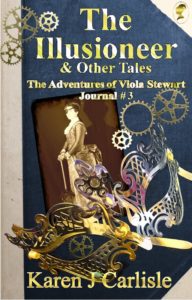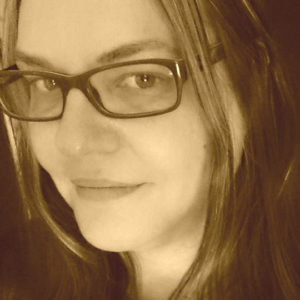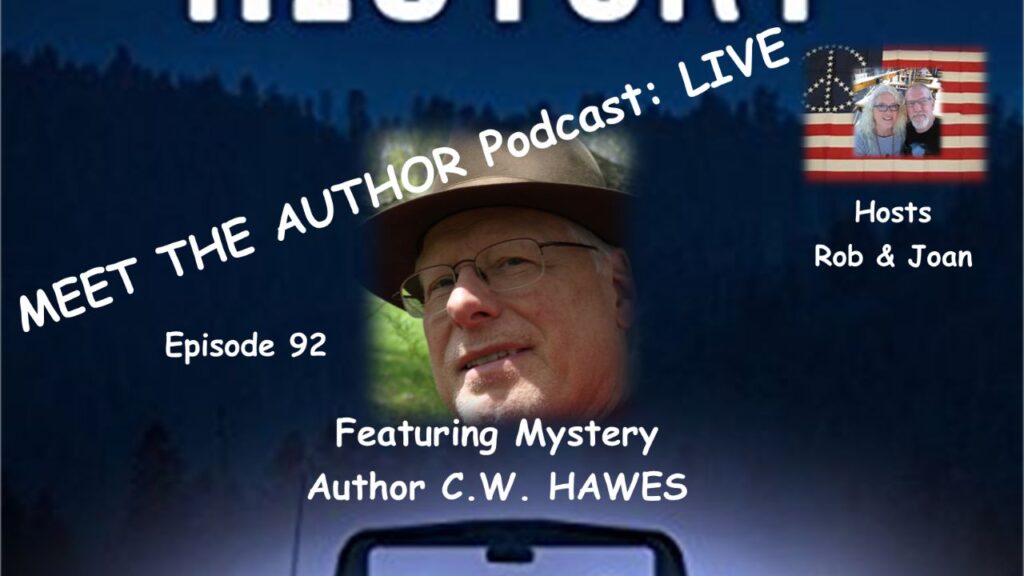
I’ve never been a fan of time travel, yet I realized very recently that right here on planet earth we do time travel all the time. Today’s guest lives in my future and I live in her past. That’s because she sees the sun before I do and for other very scientific reasons.
I first met Karen on Twitter. I think it had to do with our mutual love of tea that we followed each other. Then we ran into each other on the now defunct Steampunk Empire. And we’ve been in each other’s future and past ever since.
So all the way from the future in Adelaide, Australia, we have with us Karen J Carlisle and she is going to talk to us about herself and her new book.
CW: Welcome, Karen! Glad you can visit with me here in the past. At least it’s the past for me. For you it’s the present.
Karen Carlisle: Thank you for giving me this opportunity to get in practice for being the Doctor’s next companion.
CW: My pleasure. So, tell us a little about yourself.
KC: I’m a science geek. I’m a Doctor Who fan. I’m an artist. I love to garden. I’ve played D&D since 1979 and have been a historical re-enactor since 1994 (though I don’t get much time to do it now).
When I left school, I wanted to be a writer, an archeologist, a photographer, a cinematographer, an artist, an astronaut and the Doctor’s next companion. Instead I did my B App Sc and became an optometrist.
After a few false starts and an unexpected, and forced, career change, I’m now pursuing my first love of writing. I work more hours than I ever did before. And I’m loving it. I get to create things. (Some people even like them.) Bonus!
CW: What did you read as a child?
KC: The earliest recollection is a book from primary school: ‘Stig of the Dump’ by Clive King. For some reason that one sticks in my head. My favourite childhood book was ‘The Dark is Rising’, by Susan Cooper. I’ve just finished re-reading it. Still love it.
I moved onto crime and mystery, delving into Agatha Christie, Ngaio Marsh and Sherlock Holmes books. A librarian, who wanted to expand my reading diet, introduced me to ‘The Hobbit’ and ‘Lord of the Rings’ and then I gorged on fantasy. Science fiction wasn’t far behind. I think I’ve read just about every Star Wars novel and Doctor Who novel that was published in the 70s and 80s. So, most of my literary diet is fantasy, science fiction or mystery-who-dunnits.
CW: Aside from writing, how do you spend your free time?
KC: I love to create.
I’ve been a costumer since 1980 (my first fan con was Conquest in Brisbane). I do photography, draw (pen and ink mostly. I have some of my work on Redbubble). I’m also a Doctor Who fan (since early 70s) and an old movie buff.
I spend a lot of time in the garden – though I’ve neglected it this year. I have a chemical-free (mostly) edible garden, and companion plant garden as well.
There are way too many things to distract me. I can’t list them all here.
CW: How many fiction books do you read a year?
KC: I’m a notoriously slow reader these days. I used to read a few books a month when I was at university.
These days (due to an extraocular muscle imbalance – oh ugh, technical jargon.), I can manage one a month. This year, I’ve struggled to complete three, as I was ill most of summer and am slammed with a writing deadline at the moment. Though I still buy books as if I was still reading at Uni-speed.
My ‘must must- read’ pile is nudging nineteen books. Guess what I’m doing when this book is published?
CW: What book do you think everyone should read and why?
KC: 1984 by George Orwell.
I studied this book in high school. It’s a cautionary tale for those of us who value personal or thought freedom, and a handbook to those who seek to control the masses. Read it.
These days, I see parallels all around me. Social media playing Big Brother – watching our every move, And we let it happen. Ordinary people participate, swept up in the group mentality, while those who shout the loudest vilify and control those on the fringe, or those with differing opinions.
Governments are defunding arts and declare words, such as ‘climate change’, should not be used in official documents and research. Both are known tactics when trying to curb independent thought and control a population.
It’s all there in 1984. It’s been used before, to great (and detrimental) effect… And we all know how that ended.
Or is that being too cynical?
CW: No, not at all! 1984 is one of the all time great books. It is definitely a must read, as you say, if we care at all about our actual liberty and our freedom to think. And again, as you point out, we do indeed know the real life exemplars of 1984 ended.
So tell us, now, about a book that has influenced you as a person.
KC: Okay, this will get a bit deep and meaningful now. If I dig down to my philosophical and emotional core, the New Testament of the Bible had the earliest and lasting effect on me.
I was brought up a Methodist but taught to question why, and not follow blindly. I believe if we treat others equally – as we expect to be treated – then the world will be a better place. No strings attached. No caveats. No buts. Everyone has a right to live and love. This hope keeps me going, gets me through moments of anxiety.
Bill and Ted (as in Excellent Adventure) got it right: Be excellent to each other.
CW: It is the Golden Rule in practice. You are absolutely right: if we only followed it, our world would be a much better place for everyone.
Okay. You are being exiled to a small island in the Pacific. You can take 3 books with you. What books would you take and why?
KC: Argh, the answer changes whenever I get asked this question; it depends on my mood and where my headspace is in at the time.
Right now? In no particular order:
- Lord of the Rings (the trilogy in one book — even if that is cheating). I find the story full of hope, of undying friendships, loyalty and love, and good triumphing over evil. All these things seem to be of lower priority these days, but it is something most people crave. I need a friend who will keep looking for me and rescue me, or at least do regular book drops. (Or at least will help me hide the bodies… Did I say that out loud?) Plus I have a thing for Aragorn.
- Blue Moon Rising by Simon R Green. This is my ‘comfort book’. I read it first in the 80s. It’s a feel-good, fun adventure, with a spirited female character and an unlikely hero. Its voice is easy to read. It always makes me feel better.
- A never-ending notebook (and pencils). If I couldn’t write while I’m there, I’d go absolutely barmy! (NB: I take it an unending dark chocolate supply is a given, right?)
CW: We’ll make an exception on the dark chocolate, just for you. Now tell us, please, about a book that’s influenced you as a writer.
KC: I can’t confine myself to one. I’d say it’s a combination of writers – Agatha Christie (many of my stories end up with as mysteries), Conan-Doyle (Sherlock Holmes – for mysteries and that slightly off-kilter Victorian feel), and Gail Carriger (for her voice, which she calls comedy of etiquette. I wish I’d come up with that phrase!)
CW: Of all your books, which one is your favorite and why?
KC: Of the books I’ve written? That would be ‘Doctor Jack’.
I’ve always had a fascination with Jack the Ripper – not the creature himself, but the history and mythology that has been woven around it. Who was he? Will we ever know? Why did the chief of police really scrub away the graffiti on the wall – was it political, was it a cover up? Why didn’t they use some of the latest forensic methods, such as fingerprints (the new technique had been used in France)? Was there a conspiracy? Why weren’t some of the newspaper eye witness accounts used in the coroner’s court? There have been so many theories over the years, yet we are no closer. It is the ultimate true crime who-dunnit. It was a story rife for speculation.
I wrote ‘Doctor Jack’ as an experiment in writing from the villain’s point of view. Every bad guy thinks he’s the hero of their own story. They have their own loves and hates, their own dreams and goals. I wanted to show that , and perhaps have the reader understand his thinking, without necessarily condoning it. I mean, the murders were horrid.
CW: If I hadn’t read any of your books, which one should I start with and why?
KC: Start with Doctor Jack & Other Tales (paperback).
This is the first paperback in the first series I’ve written. You can read each story separately; they are complete in themselves, but there is a background story arc threaded through them, which concludes in The Illusioneer (I’m working on now).
If you read the ebooks, start with the novella, Doctor Jack – my retelling of the Jack the Ripper story. Doctor Jack was my favourite story to write. You can go back and catch up on the first three short stories, which fill in the background. However, Doctor Jack does have a spoiler for the second short story, An Eye for Detail.
CW: Where we can find your books?
KC: You can find shopping details and links on my webpage: www.karenjcarlisle.com/shop
They are available via various online bookstores in Australia and internationally, including:
Amazon, Smashwords, iBooks, Kobo, Barnes & Noble, Booktopia, Fishpond, Angus & Robertson/Bookworld.
You can also buy the paperback direct from me (if you live in Australia).
CW: Would you give us contact information, such as a url to your website, Amazon page, Facebook page, or wherever else we can find you?
KC: Sure!
Web: www.karenjcarlisle.com
Twitter: https://twitter.com/kjcarlisle
Facebook: https://www.facebook.com/KarenJCarlisle/
Goodreads: https://www.goodreads.com/KarenJCarlisle
CW: Thank you so much for visiting with me in the past. I hope things are just fine in your present, which is my future. Goodness. Thanks again, Karen, for visiting. All the best to you.
KC: Thank you for having me on your blog!
CW: And if you head on over to www.karenjcarlisle.com and answer today’s question, Karen will put your name into the hat for a chance to win an ebook of one of Viola Stewart’s adventures. That is a very good deal!

Karen J Carlisle is an imagineer and writer of steampunk, Victorian mysteries and fantasy. She was short-listed in Australian Literature Review’s 2013 Murder/Mystery Short Story Competition and published her first novella, Doctor Jack & Other Tales, in 2015. Her short story, ‘Hunted’, was featured in the Adelaide Fringe exhibition, ‘A Trail of Tales’.
Karen lives in Adelaide with her family and the ghost of her ancient Devon Rex cat.
She’s always loved dark chocolate and rarely refuses a cup of tea.

The Illusioneer & Other Tales
Viola Stewart returns for a third set of adventures.
Viola needs a holiday. But, even at the beach, or while partying on the grand tour of Europe… there are things afoot.
Seeing is believing… or is it?
The Illusioneer & Other Tales: The Adventures of Viola Stewart Journal #3 is currently scheduled for release in late October/early November.
For more information, sign up for Karen’s newsletter: http://karenjcarlisle.com/sign-up-email-list/
Share This!


